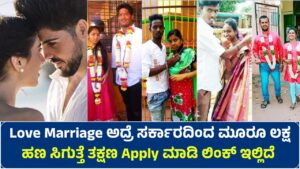Love Marriage ಅದ್ರೆ ಸರ್ಕಾರದಿಂದ ಮೂರೂ ಲಕ್ಷ ಹಣ ಸಿಗುತ್ತೆ ತಕ್ಷಣ Apply ಮಾಡಿ ಲಿಂಕ್ ಇಲ್ಲಿದೆ
Intercaste Marriage Scheme
Introduction to Intercaste Marriage Schemes
Intercaste marriages represent a union between individuals from different social or cultural backgrounds, often transcending deeply ingrained caste systems. Such marriages are seen as a step toward social integration and the dismantling of caste-based discrimination. Recognizing the potential of intercaste marriages to foster societal harmony, various governments and organizations have introduced incentives and schemes to promote these unions.

Historical Context and the Role of Caste in Marriage
- Understanding Caste System Origins: A brief history of the caste system in India, its evolution, and its societal implications.
- Impact on Marital Practices: The traditional emphasis on endogamy within castes and the resistance to intercaste unions.
- Modern Shifts: Changing societal norms, urbanization, and education contributing to the rise in intercaste marriages.
The Importance of Intercaste Marriage Schemes
- Promotion of Equality: Encouraging equality by breaking caste barriers.
- Reducing Caste-Based Discrimination: How these schemes aim to minimize social hierarchies.
- Fostering Social Unity: The broader implications for societal harmony and inclusivity.
Key Intercaste Marriage Schemes in India
- Dr. Ambedkar Scheme for Social Integration Through Intercaste Marriages:
- Overview: Initiated by the Ministry of Social Justice and Empowerment, this scheme provides financial incentives for intercaste couples, especially those involving Scheduled Castes.
- Eligibility Criteria: Requirements such as one spouse belonging to the SC community and registration of the marriage.
- Benefits: Monetary rewards, assistance for housing, and support for establishing a livelihood.
- Implementation Challenges: Resistance from traditional communities, administrative bottlenecks, and awareness issues.
- State-Level Initiatives:
- Tamil Nadu: The Tamil Nadu government offers financial support and gold to couples opting for intercaste marriages.
- Maharashtra: Maharashtra’s Annasaheb Patil Intercaste Marriage Scheme promotes such unions with financial aid.
- Karnataka: Financial grants and priority in housing schemes.
- Non-Governmental Support:
- Role of NGOs in supporting intercaste couples with counseling, legal aid, and community acceptance.
Eligibility and Application Process
- Eligibility Requirements: Citizenship, age, caste verification, and marriage registration.
- Application Procedures: Step-by-step guide to applying for benefits under these schemes.
- Documentation Needed: Proof of marriage, caste certificates, income certificates, and bank account details.
Success Stories: Real-Life Examples
- Case Studies of Successful Intercaste Marriages: Highlighting how these schemes transformed lives.
- Positive Outcomes: Improved societal acceptance, financial stability, and educational opportunities for children.
Challenges and Criticism
- Societal Resistance: Opposition from families and communities due to deep-rooted traditions.
- Administrative Hurdles: Delays in processing applications and disbursing funds.
- Misuse of Schemes: Instances where benefits are exploited without genuine intercaste integration.
Measures to Strengthen Intercaste Marriage Schemes
- Enhanced Awareness Campaigns: Using media and grassroots movements to promote intercaste marriages.
- Simplified Procedures: Streamlining the application and verification processes.
- Community Engagement: Initiatives to address societal resistance and foster acceptance.
Comparative Analysis: India and Other Nations
- Intercaste Marriage Policies Worldwide: Practices in countries like Nepal and South Africa.
- Lessons for India: What India can learn from global examples in promoting intercultural unions.
Impact on Society
- Reduction in Social Inequality: Breaking the cycle of caste-based disparities.
- Improved Gender Equality: Empowering women through intercaste marriages and financial independence.
- Future Implications: Long-term benefits for national unity and social cohesion.
Financial Details of Major Schemes
- Budget Allocation: How much governments invest in promoting these marriages.
- Disbursement Mechanisms: Processes for transferring benefits to beneficiaries.
Role of Technology in Promoting Intercaste Marriages
- Digital Platforms: How websites and apps connect intercaste couples.
- Online Applications: E-governance initiatives for smoother implementation of schemes.
Vision for the Future
- Policy Recommendations: Suggestions to enhance the reach and efficacy of intercaste marriage schemes.
- Role of Education: The importance of sensitizing younger generations about caste equality.
Conclusion
Intercaste marriage schemes are a beacon of hope in dismantling caste-based barriers and building an inclusive society. While challenges persist, consistent efforts by governments, NGOs, and communities can transform the societal fabric, ensuring that love transcends the constraints of caste.
If you need further details or a specific focus within this topic, feel free to ask!
